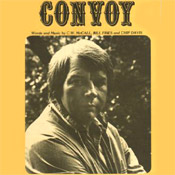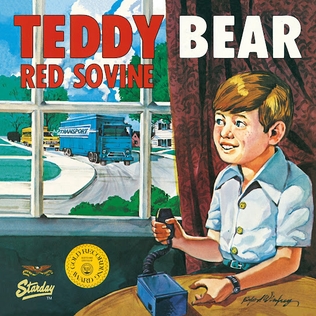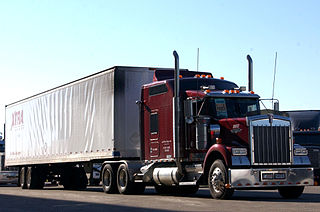Related Research Articles
Country is a music genre originating in the Southern and Southwestern United States. First produced in the 1920s, Country music primarily focuses on working class Americans and blue-collar American life.

A truck or lorry is a motor vehicle designed to transport freight, carry specialized payloads, or perform other utilitarian work. Trucks vary greatly in size, power, and configuration, but the vast majority feature body-on-frame construction, with a cabin that is independent of the payload portion of the vehicle. Smaller varieties may be mechanically similar to some automobiles. Commercial trucks can be very large and powerful and may be configured to be mounted with specialized equipment, such as in the case of refuse trucks, fire trucks, concrete mixers, and suction excavators. In American English, a commercial vehicle without a trailer or other articulation is formally a "straight truck" while one designed specifically to pull a trailer is not a truck but a "tractor".

Citizens band radio, used in many countries, is a land mobile radio system, a system allowing short-distance one-to-many bidirectional voice communication among individuals, using two-way radios operating near 27 MHz in the high frequency or shortwave band. Citizens band is distinct from other personal radio service allocations such as FRS, GMRS, MURS, UHF CB and the Amateur Radio Service. In many countries, CB operation does not require a license, and may be used for business or personal communications.

A truck driver is a person who earns a living as the driver of a truck, which is commonly defined as a large goods vehicle (LGV) or heavy goods vehicle (HGV).

"Convoy" is a 1975 novelty song performed by C. W. McCall that became a number-one song on both the country and pop charts in the US and is listed 98th among Rolling Stone magazine's 100 Greatest Country Songs of All Time. Written by McCall and Chip Davis, the song spent six weeks at number one on the country charts and one week at number one on the pop charts. The song went to number one in Canada as well, hitting the top of the RPM Top Singles Chart on January 24, 1976. "Convoy" also peaked at number two in the UK. The song capitalized on the fad for citizens band (CB) radio. The song was the inspiration for the 1978 Sam Peckinpah film Convoy, for which McCall rerecorded the song to fit the film's storyline.
This is a list of notable events in country music that took place in the year 1976.

Movin' On is an American drama television series. It ran for two seasons from 1974 to 1976 on the NBC network.
James Wesley "Jay" Huguely was an American stage actor, singer, advertising executive, and television writer and executive. He enjoyed a brief run of popularity as a novelty recording artist in the 1970s, billed as Cledus Maggard & the Citizen's Band. He worked for Leslie Advertising in Greenville, South Carolina and enjoyed his only hit in 1976 with "The White Knight", released during the wave of popularity of the citizens' band radio. The song is about a truck driver victimized by a Georgia highway patrolman's speed trap. He chose the name "Cledus" after his mother's name Cleta.
Bill Mack Smith Jr. was an American country music songwriter, singer, and radio host. While at WBAP Radio, Mack initiated the Bill Mack Million Mile Club for truckers achieving one million miles of accident-free over-the-road driving.

"Teddy Bear" is a song co-written and recorded by American country music singer Red Sovine. It was released in June 1976 as the title track to Sovine's album of the same name.
"The White Knight" is a novelty country music song made famous by Jay Huguely, who - recording as Cledus Maggard & The Citizen's Band - enjoyed a brief run of national popularity with the song when it became popular in 1976.

"Six Days on the Road" is an American song written by Earl Green and Muscle Shoals Sound Studio songwriter Carl Montgomery, made famous by country music singer Dave Dudley. The song was initially recorded by Paul Davis and released in 1961 on the Bulletin label. In 1963, the song became a major hit when released by Dudley, peaking at #2 on the Billboard Hot Country Songs chart and cracking the Top 40 (#32) on the Hot 100, leading to it being hailed as the definitive celebration of the American truck driver.
P.A.M. Transportation Services Inc. is an irregular route over-the-road trucking company that is based in Tontitown, Arkansas. Founded in April 1980, P.A.M's current service area covers the lower continental 48 states as well as the southern parts of Ontario, Canada. In the early 1990s, P.A.M. began providing transportation services to Mexico under agreements with several Mexican trucking carriers. P.A.M. Transport serves clients primarily in the automotive, manufacturing, and retail industries and its primary freight consists of general commodities, automotive parts, and heating and air conditioning units. According to the Hoovers financial data on this company, P.A.M.’s company name stands for Pretty Awesome Mileage, yet according to the company's own FAQ on their website, P.A.M. is short for the company founder's initials, Paul Allen Maestri.

The trucking industry serves the American economy by transporting large quantities of raw materials, works in process, and finished goods over land—typically from manufacturing plants to retail distribution centers. Trucks are also used in the construction industry, two of which require dump trucks and portable concrete mixers to move the large amounts of rocks, dirt, concrete, and other building materials used in construction. Trucks in America are responsible for the majority of freight movement over land and are tools in the manufacturing, transportation, and warehousing industries.
A specialized set of jargon describe the tools, equipment, and employment sectors used in the trucking industry in the United States. Some terms may be used within other English-speaking countries, or within the freight industry in general. For example, shore power is a term borrowed from shipping terminology, in which electrical power is transferred from shore to ship, instead of the ship relying upon idling its engines. Drawing power from land lines is more efficient than engine idling and eliminates localized air pollution. Another borrowed term is "landing gear", which refers to the legs which support the front end of a semi-trailer when it is not connected to a semi-truck. Some nicknames are obvious wordplay, such as "portable parking lot", in reference to a truck that carries automobiles.

The portrayal of the trucking industry in United States popular culture spans the depictions of trucks and truck drivers, as images of the masculine side of trucking are a common theme. The portrayal of drivers ranges from the heroes of the 1950s, living a life of freedom on the open road, to the depiction of troubled serial killers of the 1990s. Songs and movies about truck drivers were first popular in the 1940s, and mythologized their wandering lifestyle in the 1960s. Truck drivers were glorified as modern day cowboys, outlaws, and rebels during the peak of trucker culture in the 1970s.

The trucking industry in the United States has affected the political and economic history of the United States in the 20th century. Before the invention of automobiles, most freight was moved by train or horse-drawn vehicle.

A self-driving truck, also known as an autonomous truck or robo-truck, is an application of self-driving technology aiming to create trucks that can operate without human input. Alongside light, medium, and heavy-duty trucks, many companies are developing self-driving technology in semi trucks to automate highway driving in the delivery process.
References
- ↑ Stern, Jane Trucker, A Portrait of the Last American Cowboy (1975)
- ↑ Thanki, Juli. "Country, bluegrass great Wiseman, dead at 93". No. Vol.115, No.56. The Tennessean. p. 1A. Retrieved 25 February 2019.
- ↑ James Wesley Huguely=Cledus Maggard Retrieved 9 February 2021
- ↑ "Dave Dudley" . Retrieved 2009-02-24.
- ↑ Roach, Joyce Gibson "Diesel Smoke & Dangerous Curves: Folklore of the Trucking Industry" Hunters and Healers (1977) pp. 45–53
- ↑ American Truck Historical Society, <www.ATHS.org>
- ↑ Danker, Frederick E. "Trucking Songs: A comparison with Traditional Occupational Song" Journal of Country Music (Jan 1978) pp78-89
- ↑ Roach, Joyce Gibson Hunters & Healers
- ↑ Porter, Bernard H. "Truck Driver Lingo" American Speech (Apr 1942) pp102-105
- ↑ Seese, Gwyneth E. (Dandalion) Tijuana Bear in a Smoke'um Up Taxi 1977
- ↑ Schroeder, Fred "A Bellyful of Coffee: The Truck Drivin' Man as Folk Hero" Journal of Popular Culture (Spring 1969) pp 679–687
- ↑ Johnson, Jon "Watson, George, Holiday" Country Standard Time (Aug/Sept 2000) pp7-9